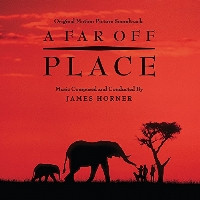- Composed by James Horner
- Intrada / 2015 / 76m
Reese Witherspoon must trek across the Kalahari desert with a young man in a desperate quest to reach the protection of Maximillian Schell after her family is brutally murdered by poachers. No, I am not issuing an instruction (sadly the Movie Wave website has not yet attained those powers); rather, I am describing the plot of the 1993 live-action Disney motion picture A Far Off Place, which also featured some elephants and grossed $12.9m at the box office in the United States.
These days a new James Horner score comes along barely more often than Halley’s comet, but it was a different story back in the early 1990s. A Far Off Place was one of ten films released in 1993 featuring his music – unless I’m very much mistaken, that’s almost one per month. The film may not have made much of an impression but its youngsters-in-peril-in-stunning-landscapes nature was obviously fertile ground for any film composer, especially one with Horner’s gifts.
The early signs are promising. The five-minute main title focuses on the score’s main theme and it’s a Horner stunner, soaring majestically away like the sun rising in the morning, featuring a sweet and truly memorable melody, lots of colour (including the composer’s old favourite, the shakuhachi), a B-section that’s a lovely precursor to the great Legends of the Fall – it would grace any score and deserves to be far better-known than it is. Whenever it appears in the score its appearance is welcome.
The thing is… whenever it doesn’t appear in the score, there’s something just a bit off. James Horner is as distinctive a composer as film music has ever had (even when he’s plundering the classics he still somehow makes it sound like himself) and whether it’s a zany score for a kids’ movie, a sweeping romantic weepy, a sparse and tense thriller… James Horner sounds like James Horner. And yet – apart from the main theme – A Far Off Place doesn’t sound like James Horner. It’s frequently pleasant and decent enough – but lacks a magic touch.
On the old 40-minute Intrada album released at the time of the film, this wasn’t particularly noticeable; that one focused on cues built around the main theme, with a handful of action set-pieces sprinkled through. This new release, almost double the length, reveals a lot of generic cues without much personality, handled competently but distinctly unmemorable in nature. The preponderance of very short cues – another completely uncharacteristic thing for James Horner, who has always favoured through-composing lengthy cues – doesn’t help matters. One can’t help but wonder whether all those projects he had on the go at the time meant the composer had to bring in assistance from elsewhere to get this one done.
I don’t want to suggest the score is without merit because it isn’t. Some of the action music is pretty ferocious stuff, there are some lovely gentle moments, strained emotions in dramatic passages. It just tends to go in one ear and out of the other – except when the truly outstanding main theme is around and one outstanding action cue, “The Swamp”. Rarely can having an extended release have done so few favours to a film score because the old album – while not a classic – was an engaging and appealing one. My advice – stick with that one. If you don’t have it, then buy this one and only listen to the previously-released cues.
Rating: ***
facebook.com/moviewave | twitter.com/MovieWaveDotNet | amazon.com













That picture of James is soo old it is painfully funny. Please, a recent picture wouldn’t hurt.
It’s meant to be from around when the score was written (may in fact be a bit more recent than that).
Oh, thank goodness I’m not the only one who noticed that. When listening to the Old Album Years ago, I already thought that some Cues doesnt sound like James Horner at all and, like you, assumed that due to his extremely busy year, turned to others to ghostwrite some Music.
While writing this, I took a look at the Films’ Credits at the imdb and there Thomas Pasateri, Brad Dechter, Frank Bennett and Joel Rosenbaum are credited as *uncredited* Composers (additional Music) – except Bennett, all of these People also worked as Orchestrators on this Project.
The end credit suite on this is one of my favorite Horner pieces. The rest I forget about as soon as it’s over!
Strange. I think this new edition pays homage to the beauty of James Horner’s music adding several melodic cues sweetening the agressive ones. If not the best of Horner’s scores, this one includes as you noticed a magnificent main title, so great in fact that the action music seems generic in comparison. Moreover it is music that tells a story. Not such a common place nowadays. Well James I’m surprised you just gave a 3 stars for I think this is a vast improvement on the 1st ed.
Just received this in the mail and giving it a spin. I can’t stop playing the first and final tracks to hear that glorious soaring theme that James gets so right. One of his most heartfelt IMHO. I will need to listen to the tracks in between of course but right now just so touched by the opening and ending tracks. No doubt the passing of this talented genius makes every note somehow more precious. Thank you for these wonderful reviews. I’m draining my bank account because of them.